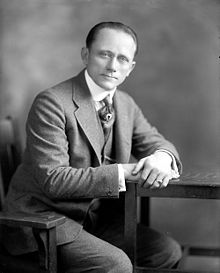Theodore Bilbo
| Theodore G. Bilbo | |
|---|---|
 |
|
|
United States Senator from Mississippi |
|
|
In office January 3, 1935 – August 21, 1947 |
|
| Preceded by | Hubert D. Stephens |
| Succeeded by | John C. Stennis |
| 43rd Governor of Mississippi | |
|
In office January 17, 1928 – January 19, 1932 |
|
| Lieutenant | Cayton B. Adam |
| Preceded by | Dennis Murphree |
| Succeeded by | Martin Sennett Conner |
| 39th Governor of Mississippi | |
|
In office January 18, 1916 – January 20, 1920 |
|
| Lieutenant | Lee M. Russell |
| Preceded by | Earl L. Brewer |
| Succeeded by | Lee M. Russell |
| 17th Lieutenant Governor of Mississippi | |
|
In office January 16, 1912 – January 18, 1916 |
|
| Governor | Earl L. Brewer |
| Preceded by | Luther Manship |
| Succeeded by | Lee M. Russell |
| Member of the Mississippi Senate | |
|
In office 1908–1912 |
|
| Personal details | |
| Born |
Theodore Gilmore Bilbo October 13, 1877 Pearl River County, Mississippi, U.S. |
| Died | August 21, 1947 (aged 69) New Orleans, Louisiana, U.S. |
| Resting place | Juniper Grove Cemetery, Poplarville, Mississippi, U.S. |
| Nationality | American |
| Political party | Democratic |
| Spouse(s) | (1) Lillian Selita Herrington (1898–1899, died) (2) Lida Ruth Gaddy |
| Education | |
| Religion | Baptist; Freemason |
Theodore Gilmore Bilbo (October 13, 1877 – August 21, 1947) was an American politician who twice served as governor of Mississippi (1916–20, 1928–32) and later was elected a U.S. Senator (1935–47). A master of filibuster and scathing rhetoric, a rough-and-tumble fighter in debate, he made his name a synonym for white supremacy. Like many Southern Democrats of his era, Bilbo believed that black people were inferior; he defended segregation, and was a member of the Ku Klux Klan.
Bilbo was educated in rural Hancock County (later Pearl River County). He attended Peabody Normal College in Nashville, Tennessee and Vanderbilt University Law School. After teaching school he attained admission to the bar in 1906, and practiced in Poplarville. He then served in the Mississippi State Senate for four years, 1908 to 1912.
Bilbo overcame accusations of accepting bribes and won election as lieutenant governor, a position he held from 1912 to 1916. In 1915, he was elected governor, and he served from 1916 to 1920. During this term he earned accolades for enacting Progressive measures such as compulsory school attendance, as well as increased spending on public works projects. He was an unsuccessful candidate for the United States House of Representatives in 1920.
Bilbo won election to the governorship again in 1927, and served from 1928 to 1932. During this term Bilbo caused controversy by attempting to move the University of Mississippi from Oxford to Jackson. In another controversy, he aided Democratic nominee Al Smith in the 1928 presidential election by spreading the story that Republican nominee Herbert Hoover had socialized with a black woman; Southern voters, considering whether to maintain their allegiance to the Democratic Party in light of Smith's Catholicism and support for the repeal of Prohibition largely remained with Smith after Bilbo's appeal to racism. In 1930, under Governor Bilbo, Mississippi introduced a sales tax – the first American state to do so.
...
Wikipedia
